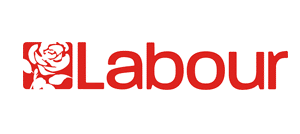Egypt
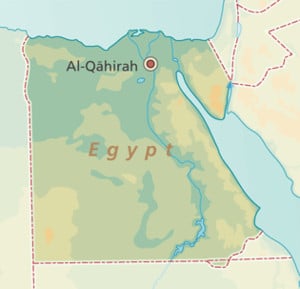
Egypt’s political history has been tumultuous in recent years. After the 2011 revolution, which ended the repressive thirty-year regime of Hosni Mubarak, there was a short experiment with democracy. The first free presidential and parliamentary elections were organized in 2012. Mohamed Morsi and the FJP (political branch of the Muslim Brotherhood in Egypt) became the winners. Unrest in the country remained, however. A few months later, in November 2012, President Morsi issued a temporary constitutional declaration that in effect gave him unlimited powers, which led to the outburst of mass protests. In July 2013 Morsi was removed from office by a coup d’état led by the army under General Sisi. In 2014 the general was elected president.
-
Want to get notified by mail when this country gets updated?
Subscribe to our newsflash below!
Key Info
1 Political Situation
In 2014, the former head of the Egyptian Armed Forces, Abdel Fattah al-Sisi, was elected president. In order to overcome the mass protests and chaos in the country, al-Sisi introduced a roadmap to help the transition of the country. One of the most important steps of the roadmap was the introduction of a new constitution, drafted by a 50-member committee. The constitution was approved by a referendum in January 2014, although serious doubts over the fairness and the political climate during the referendum have been cast. In 2019, Egyptians overwhelmingly approved another referendum on constitutional changes. Presidential terms were lengthened from four years to six, and instead of presidents being limited to maximum two terms, they are allowed three. These changes allow al-Sisi to stay in power until 2030.
Al-Sisi has cracked down hard on political opponents and independent media. Since 2015, many former Muslim Brotherhood leaders and members have been jailed, sentenced and completely banned from political participation. Journalists have been persecuted on a large scale and media freedom has been restricted. Furthermore, instability in the Sinai provinces has grown, where Islamist insurgents are fighting the Egyptian army. As a result, Egypt closed the Rafah border crossing with the Palestine Territories.
Egyptian revolution (2011) and following crisis
The Tunisian revolution that broke out in December 2010 sparked the Egyptian people to take to the streets as well. Starting from the 25th of January large scale demonstrations were organised in different cities in Egypt calling for an end to President Hosni Mubarak’s three-decade rule. Dissatisfactions over corruption, lack of freedom of speech, economic issues such as food price inflation, high unemployment, low wages and the enrichment of the ruling elite were the reasons for the protests. Mubarak repeated he would remain in power until September. Angry that Mubarak did not step down, protests resulted in a nationwide escalation dubbed ‘Farewell Friday’ on the 11th of February. At 16.00 hour the same day, the Egyptian Vice-president Omar Suleiman announced in a televised address that President Hosni Mubarak had stepped down and had handed over authority to the Supreme Council of Armed Forces (SCAF), which announced that it would remain in charge of the country until a president would be elected.
Egyptian voters overwhelmingly approved a referendum on constitutional changes a month later, which paved the way for new elections. From November 2011 – January 2012 the first free parliamentary elections were held in Egypt. The Freedom and Justice Party (FJP), linked to the Muslim Brotherhood, was the big winner. A few months later, Mohamed Morsi, leader of the FJP, was announced as the winner, becoming the first democratically elected civilian president.
In November 2012, President Morsi issued a temporary constitutional declaration that in effect gave him unlimited powers, which led to the outburst of mass protests. By the end of June 2013 the protests, which were also fueled by the prosecutions of journalists and attacks on non-violent protesters, escalated after opposition parties and millions of protesters urged Morsi to step down. In July 2013, Morsi was removed from office by a coup d’état led by the army under General Abdel Fattah al-Sisi.
The Muslim Brotherhood protested against the military coup, but these protests were crushed in the August 2013 massacre in Rabaa in which at least 817 civilians were killed. Since his overthrow, Egyptian prosecutors have charged Morsi with various crimes and sought the death penalty, a move denounced by Amnesty International as “a charade based on null and void procedures”. He received multiple long sentences, including a life sentence for spying for Qatar. The death sentence was overturned in a retrial in November 2016, but for Morsi the outcome barely mattered: he passed away in court in 2019.
Political rights and civil liberties
The authorities in Egypt continue to punish public or perceived dissent, severely repressing the rights to peaceful assembly and freedom of expression and association. Press freedom is severely restricted in Egypt, and the country ranks 160 out of 180 countries according to the 2021 World Press Freedom Index. There are many laws limiting press freedom. A terrorism law adopted in 2015 obliges journalists to report only the official version of “terrorist” attacks on national security grounds, and a cyber-crime law of 2018 made it possible for the government to prosecute journalists and close down websites for sharing independently reported information online. Journalists are frequently arrested, and Egypt is now one of the world’s biggest jailer of journalists, some spending years in jail without being charged or tried.
The work of NGOs and civil society is often limited, especially after the introduction of the ‘NGO-law’ in 2019. It gives Egyptian authorities extended power over NGOs, permitting them to reject the registration of NGOs, prohibit activities that violate “national security”, and places all finances of NGOs under Central Bank monitoring. The law cripples the work of NGOs and civil society organisations, and puts employees in danger of arbitrary arrest.
Human rights and gender equality
Human rights continue to be violated in Egypt, also outside of the political and organizational spectrum. Gender inequality is a large problem, with discriminatory laws and practices. Sexual violence occurs frequently, but perpetrators are rarely arrested or charged. Furthermore, according to Human Rights Watch, authorities have been using “morality” charges to prosecute female social media influencers, witnesses, and survivors of sexual violence.
LGBT+ rights are often violated, with LGBT+ people arbitrarily arrested, detained in inhuman conditions and subjected to torture. Egypt has repeatedly rejected recommendations by the international community to end arrests and discrimination based on sexual orientation and gender identity. At a United Nations Human Rights Council held in March 2020, Egypt denied the existence of LGBT+ people, and consequently refuses to protect them.
2 Elections
Electoral system
The constitution of 2014 abolished the old Shura Council (Upper House), while the old People’s Assembly (Lower House) was replaced by the House of Representatives. In total 596 MPs are elected in two rounds. 120 of them are elected through coalition-based lists. Their selection is based on a ‘winner takes all’ system, that awards all the seats to one party if they surpass 50 per cent of the votes. Furthermore, 448 independent candidates are elected, some of them backed by political parties. The final 28 MPs are appointed by the President. The MPs are elected from 205 districts. The coalition-based lists have quota for Christians and women. Of those appointed by the President, 14 have to be women and all have to be independent from political factions.
Constitutional referenda, 2014 and 2019
In January 2014 Egyptians voted for the first time since Morsi’s ouster in a referendum on a new constitution, which replaced the constitution passed under Morsi. It was drafted by a 50-member committee including only two representatives of Islamist parties. The Muslim Brotherhood was not represented. Therefore, an Islamist coalition led by the Muslim Brotherhood called for a boycott and “civilized peaceful protests” during the two-day referendum. Many of Egypt’s secular opposition joined the protests against the government and the new charter. On the first day of voting, nine people were killed in clashes between security forces and those who opposed the new constitutional amendments. On 18 January 2014, the Supreme Electoral Committee announced that 98.1 per cent of Egyptians voting in the referendum approved the amended national charter, with a turnout rate of 38.6 per cent. The new constitution boosted military powers, allowing the army to appoint a defence minister for the next eight years. It also allows civilians to be tried before military courts, and stipulates that the military’s budget will be beyond civilian oversight. Critics said the new constitution strengthens state institutions that defied Morsi: the military, the police and the judiciary, at the expense of the people. US-based Democracy International (DI), the largest international organization that monitored the referendum, expressed “serious concerns” about the political climate, which virtually guaranteed a Yes vote. “There was no real opportunity for those opposed to the government’s roadmap or the proposed constitution to dissent,” the statement noted, citing “a backdrop of arrests and detention of dissenting voices”.
In 2019, a new referendum on constitutional changes was held, meeting overwhelming approval: 88,83 percent of the votes were in favour of the changes. Presidential terms were lengthened from four years to six, and instead of presidents being limited to maximum two terms, they are allowed three. These changes allow al-Sisi to stay in power until 2030. Another measure expands al-Sisi’s power over the legislative branch by creating an upper house known as a senate, with the president handpicking a third of the members. Opponents see the changes as a further step towards authoritarianism, and a method to further the climate of oppression in the country.
The senate, as it was created in 2019, consists of 300 members serving a five-year term. The senate is divided in three groups. One-third are elected by the constituency, one-third are elected by proportional representation, and the final one-third is appointed by the president. They are tasked with providing opinions and proposals on matters of national unity, social cohesion, government structure, and constitutional amendments.
Senate elections
The first Senate elections were held in August 2020 in two rounds. The process concerned the election of 200 members of the senate, divided in two systems: an individual system and a closed list system. In the individual system the voter chooses a person, whereas in the closed-list system the voter chooses a political party, and not an individual. The final 100 senators are appointed by the president.
The voter turnout of the elections was remarkably low, particularly as voting is officially compulsory in Egypt. About 8.959 million votes were cast in the first round, resulting in a voter turnout of approximately 14.23%, with over 1 million invalid votes. The second round had a turnout of 10.22%, with 15% invalid votes. Though the turnout remained low, there have been reports of constituents being forced or encouraged intensely to vote. For example, in some parts of the country, voters were offered a box of food if they voted for a certain party in the elections. Nevertheless, turnout was low, according to critics mainly because of the symbolic advisory role of the senate leading to apathy amongst voters.
Results
The elections were divided in two rounds: 174 senators were elected with the majority of votes in the first round. The final 26 votes were determined in a second round, with 52 competing candidates. During the first round, the majority of seats were grabbed by the pro-government coalition “Unified National List”, headed by the Mostaqbal Watan (Nations Future) Party. 118 of the 200 seats went directly to the Mostaqbal Watan Party, divided in 68 individual seats and 50 party list seats. During the second round, another 20 seats were allocated to Mostaqbal Watan, ensuring their dominant position.
The list segment was decided in the first round, mainly due to the absence of competing lists. The only list accepted was the Unified National List for Egypt, led by the Mostaqbal Watan (Nations Future) Party, and therefore all 100 seats were appointed to them. Besides Mostaqbal Watan, 10 other parties participated in this list. The Senate was already dominated by pro-Sisi parties and individuals, and this election therefore did not change the political landscape, as pro-Sisi parties and individuals won by a landslide.
The final result was as follows:
| Party | Seats in senate |
| Mostaqbal Watan | 149 (88 in the individual segment, 61 in the list segment) |
| Republican People’s Party | 17 |
| Homeland Defenders Party | 11 |
| Wafd Party | 10 |
| National Progressive Unionist Party | 4 |
| Modern Egypt | 4 |
| Reform and Development | 3 |
| Egyptian Social Democratic | 3 |
| Conference | 3 |
| Patriotic Movement | 2 |
| Al-Nour Party | 2 |
| Egyptian Freedom | 1 |
| Eradet Geel Party | 1 |
| Egyptian Freedom Party | 1 |
| Sadat Democratic Party | 1 |
| Justice Party | 1 |
| Independents | 88 |
| Total | 300 |
Observers
During the Egyptian Senate elections few cases of fraud were reported, though there were some cases of voters being subject to propaganda while waiting to vote, something that is officially illegal in Egypt. There were a number of observers, including the Arab League, but no real incidents were reported.
Parliamentary elections
In June 2020, new laws were passed regarding the parliamentary elections. The number of members of parliament was increased from 540 to 568, and it was determined that half of the MPs would be elected through the individual candidacy system and the other half through the closed list system, based on a winner-takes-all system. 28 additional MPs are directly appointed by the president.
In October 2020 the most recent parliamentary elections were held in Egypt. Turnout for these elections was low, around 29%.
Results
The pro-government Mostaqbal Watan (Nations Future) Party, a party strongly in favour of President Al-Sisi, won 316 seats, nearly 55% of the total, and another pro-Sisi party, the Republican People’s party, won 50 seats. Non-affiliated candidates won 124 seats.
| Party | Seats in parliament |
| Mostaqbal Watan | 316 |
| Republican People’s Party | 50 |
| Al-Wafd | 26 |
| Guardians of the Nation Party | 23 |
| Modern Egypt Party | 11 |
| Reform and Development Party | 9 |
| Egyptian Socialist Democratic | 7 |
| Egyptian Freedom | 7 |
| Nour | 7 |
| The Congress | 7 |
| Tagammu Party | 6 |
| Adl (Justice) Party | 2 |
| Will of a Generation | 1 |
| No party Affiliation | 124 |
| Total | 596 |
These elections did not change much in the political landscape. Many of the previous MPs retained their seats, and the parliament was already controlled by supporters of Al-Sisi. This newest result does increase the share of Nation’s Future, and therefore of the pro-Sisi group in the parliament. A small opposition block of leftist and independent deputies lost seats according to official results.
Observers
During the 2020 election, independent international or domestic observers were not permitted to monitor the process, and the parliamentary elections were marred by claims of fraud, vote buying and severe interference by security apparatuses. Individuals who criticized the process were intimidated or put in jail. Furthermore, the same tactic of bribery that was used during the senate elections was employed here: voters were offered food or money to vote for certain parties.
Presidential elections
Between 26 and 28 March 2018, Egyptian voters could cast their ballots for the presidential elections. The Egyptians had to choose between two candidates: Former field marshal and incumbent President Al-Sisi –and ‘puppet’ candidate Moussa Mostafa Moussa. Leading up to the elections, the regime was hoping for a high voter turnout. State-controlled media pressured people to go to the polls. Even stating that voters who voted would be rewarded, while those who decline would be fined.
Results
Al-Sisi gained 97.08 per cent of the votes, while his only opponent, Moussa Mostafa Moussa, received 2.92 per cent of the votes, fewer votes than the number of invalid ballots (around 7%). The voter turnout was 41.05 per cent.
| Candidate | Number of votes | Percentage |
| Abdel Fattah Al-Sisi | 21,835,387 | 97.08% |
| Moussa Mostafa Moussa | 656,534 | 2,92% |
Repression
The campaign was marked by large scale repression of political opponents, activists and journalists. Former Prime Minister Ahmed Shafik, Human rights activists Khaled Ali and Anwar Essmat Sadat, nephew of late President Anwar Sadat, claimed to be pressured by agents of the National Security Agency to step out of the race. General Sami Anan and Colonel Ahmed Konsowa were both arrested after the showed their intent to run. In this hostile environment, several activists and journalists were arrested for “undermining the electoral process’’. Abdul Moneim Aboul Fotouh, a leading figure in the Strong Egypt Party (SEP), called for the boycott of the election, citing the undemocratic nature of the process. The authorities arrested several leading members of the SEP in reaction to this boycott. Journalists writing critical pieces related to these developments were harassed or arrested.
3 Political Parties
Social Democratic Parties
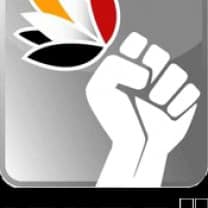
Number of seats: 7
The Egyptian Social Democratic Party was founded shortly after the overthrow of Hosni Mubarak by the merger of two minor parties, the Egyptian Democratic Party and the Liberal Egyptian Party. The party straddles a fine line between free enterprise and social justice. It advocates a civil state based on citizenship and social and economic rights are important issues. In the 2015 elections ESDP did not participate in any of the coalitions but backed independent candidates. Ahead of the elections the founder of the party, Mohammed Abou El-Ghar, resigned from his position as Secretary General, citing a split in the group. In August 2012, the party was admitted to the Socialist International as a consultative member.
Other Parties
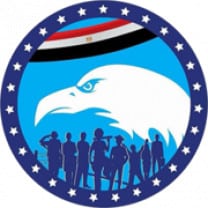
Number of seats: 316
The Nation’s Future Party was founded in 2014 and first participated in the 2015 elections. Nation’s Future has been supportive of the government and its leader Badran is considered a close ally of President Al-Sisi. Among the political parties, Nation’s Future is considered a youth party as it attracts young voters and has a young leadership. Before its foundation, members of Nation’s Future campaigned across the country to promote Al-Sisi’s transition road map and later on also Al-Sisi’s candidacy for the presidency. In its spread across the country it has been able to capitalize on student unions. The party has expressed that defending the interest of the nation and state is their priority and that they do not feel aligned with any political ideology. In the 2015 elections the party wielded both independent candidates, as well as some candidates on the list of ‘For the Future of the Nation’.

Number of seats: 26
The New Wafd Party, also known as the Al-Wafd party, created in 1978, is essentially a continuation of the pre-1952 Wafd Party. It is a liberal capitalist party that calls for public freedoms and a maximum reduction of the economic role of the state. It encourages Arab and foreign investment, the liberalisation of foreign trade and the exchange rates, and privatisation of certain parts of the public sector. Most of the Wafd economic ideas had been taken over by the former NDP. On the issue of political freedom and democratic reform, however, the Wafd is much more liberal than the NDP used to be. The Al-Wafd is often regarded as a strong opposition party. This is due to the legitimacy of the old Wafd, the possession of greater financial resources than other parties, and the several offices throughout the country. In the 2015 elections Wafd had the third most elected candidates, supporting both independent candidates as well as ten Wafd candidates on the list of ‘For the love of Egypt’.
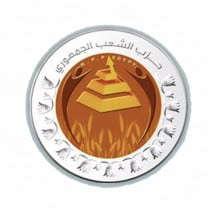
Number of seats: 50
The Republican Peoples Party (RPP) was established in 2012 by political actors opposed to the Islamic government. It has ties to former members of the Mubarak-era National Democratic Party. Before its official recognition, it merged with other parties to form the Conference Party, as an alternative to both the Militaries growing power and the Islamist government. It later broke away. Ideologically, the RPP is close to Mubarak’s politics of liberalization of the economy as well as a focus on social services such as healthcare. During the 2015 elections the RPP won 13 seats., The party has publically attacked the ‘For the Love of Egypt’ coalition.

Number of seats: 23
The Homeland Defenders Party won 12 seats in the 2015 parliamentary elections. The party is considered to be a Far Left party, with their party ideology based on Marxism and Communism.
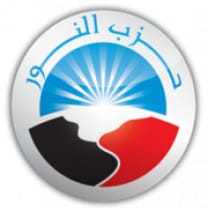
Number of seats: 7
Al-Nour is a Salafi political party founded after the January 2011 uprising. Salafism is an orthodox branch of Islam which sees the first generations of the followers of the prophet Muhammad as examples for how all aspects of life should be organized. The party advocates gradual reform under the slogan: “The only reform we desire is the reform we can achieve.” This slogan is based on a view of the principles of Islam as a comprehensive framework for religion and state. In the 2015 elections Nour was the only Islamist party, yielding both individual candidates as well as participating on one party list in the West Nile Delta constituency.
Number of seats: 7
The Conference Party was founded in 2012 bij Amr Moussa, former secretary-general of the Arab League, and is a merger between a great number of parties including the Democratic Front Party and offshoots of the National Democratic party. The party is seen as moderate and secularist.
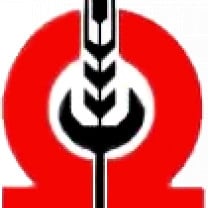
Number of seats: 6
The Tagammu’ Party, or the Nationalist Progressive Unionist Party, was created in 1976 out of the left wing of the Arab Socialist Union. It is a leftist party which calls for the establishment of a socialist society free of exploitation. It believes in a class struggle that should be resolved peacefully and bases its programme upon the goals of the 1952 revolution. The most important goals are rejecting religious extremism, building the character of the Egyptian citizens, ending the state monopoly over the media, raising awareness of environmental issues, and developing Egyptian industries. While the party once enjoyed strong support from the working class, professional unions, universities and intellectuals, its influence among these groups has since waned. It gained two seats in the parliamentary elections of 2015. Shortly before the elections, the party withdrew from the Egyptian Front.
4 Biographies
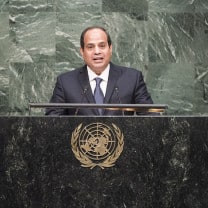
Former head of the Egyptian Armed Forces, Minister of Defence Abdul Fatah al-Sisi was born on 19 November, 1954 in Cairo. He graduated from the Egyptian military academy in 1977 and continued training in the United Kingdom, Egypt and the United States.
Under Mubarak’s regime Al-Sisi served as a military attaché in Saudi Arabia. In August 2012 Al-Sisi was appointed as head of the Egyptian Armed Forces and as Minister of Defence by Morsi. Despite some accusations of being too close to the Muslim Brotherhood he presented himself and the army as “guardians of the people’s will”, following nationwide protests in June 2013. He played a leading role in the military coup of July 2013, which ousted Morsi when he did not meet up to the army’s ultimatum to the government and its opponents to resolve the country’s crisis within 48 hours. Al-Sisi remained on his post as Defence Minister in the interim government, but in early 2014 he resigned from his post in order to run for president. He was elected president in June 2014, after it was announced that 96.91% of the votes were in his favour.
Mostafa Madbouli was born in 1966 and graduated from Cairo University's Faculty of Engineering, turning to pursue a master's degree in urban planning from Cairo University in 1992. After finishing his Ph.D. in Germany on urban planning, Madbouli married and now has three children. From 2008 to 2009, Madbouli worked as head of the state-run General Organization for Urban Planning (GOUP), and later served as director of the United Nations' HABITAT Regional Office for Arab States from 2012 until 2014. He was appointed Egyptian Minister of Housing in 2014, and temporarily replaced the then incumbent Prime Minister for a period of two months when the latter required medical treatment abroad.
After the controversial presidential elections of March 2018, re-elected President Abdel Fattah al-Sisi appointed Madbouli Prime Minister on June 7th, 2018.
Subscribe to our newsletter
